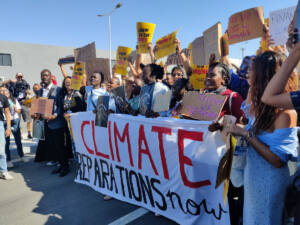
WelCom December 2022
They sang, they danced and they clapped. As world leaders gathered in Sharm El Sheikh, Egypt for the 2022 United Nations Climate Change Conference, faith organisations found their voices through protest.
Christian youth from across the world came together to dramatise the hurt the environment was going through, and with it, the entire human race.
Joe Bongay of the Catholic Youth Network for Environmental Sustainability in Africa told Catholic News Service (CNS) the protests were meant to draw attention to the need to care for the earth, in line with Pope Francis’ encyclical Laudato Si’: on Care for Our Common Home.
‘When you sing about it, when you clap about it, it reminds people of their moral obligations toward caring for what we all share, which is the common earth that we all live in,’ he said.
He told CNS how a changing climate was affecting ordinary people across Africa, citing the drought in East Africa, where the United Nations has predicted more than 50 million people will suffer from acute hunger by the end of the year.
‘We are struggling to survive in terms of food, in terms of hunger, and so many other problems brought about by climate change. Africa is at a point where it can’t even feed itself,’ he told CNS.
Nigerian Catholic activist Lucky Abeng talked about the devastating floods in his country that killed more than 600 people in October alone and displaced more than a million more. ‘Climate change is here with us,’ he said.
Rita Uwaka of Friends of the Earth Africa expressed discomfort with the presence of fossil fuel lobbyists at the COP27 event, as the climate conference is known.
‘Many corporations are taking over the climate space, hijacking and manipulating the negotiation process, and we feel that these criminals who are fuelling climate crises need to be kicked out,’ she told CNS.
She blasted leaders for seeking what she called ‘false solutions’ to the climate emergency, citing carbon markets as an example.
‘Take carbon credits for instance. It means you have to keep polluting in the developed countries, and then you come to Africa to plant trees to absorb the carbon, but you are not stopping pollution at the source. That is a false solution, and we reject it,’ she told CNS.
She complained that agro-commodities companies ‘are in the negotiation space; they are fueling a lot of land grabs in Africa – taking over forests, cutting them down and replacing them with plantations. And this increase in deforestation as a result of agro-commodities expansion is fueling climate change. But here, they are putting it as a solution.’
Rita Uwaka said local communities in Africa and other developing countries should be leading the search for solutions in which accessible and affordable renewable energy is encouraged.
‘We want solutions like agro-ecology, where you put food production in the hands of the people. We want community forest management methods that put the management of our forests in the hands of communities.’
Sources: Earthbeat (NCR); UCA News